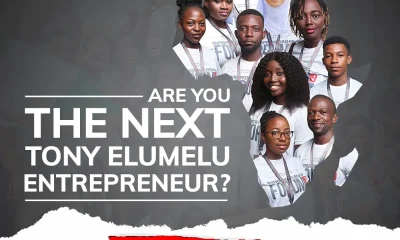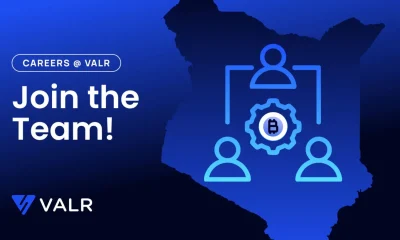Blockchain
NFTs: THE FUTURE OF BLOCKCHAIN-BASED OWNERSHIP

NFTs existed prior to gaining mainstream popularity. The inaugural NFT sale reportedly occurred in 2014, featuring “Quantum,” created and tokenized by Kevin McKoy on the Namecoin blockchain. It was subsequently minted on Ethereum and sold in 2021. Non-fungible tokens (NFTs) represent assets tokenized via blockchain technology. These tokens are unique codes generated from metadata through encryption, stored on a blockchain, while the assets they represent are held elsewhere. Their distinctiveness stems from the link between the token and the asset.
[DOWNLOAD OUR MAGAZINE]
- ALVIN RUME OPHI: INSIDE THE MIND OF A CRYPTO ANALYST
- DONJAZZY: MAKING MILLIONS WITH CRYPTO IN 10 MINUTES
- JUDE OZINEGBE: INSPIRING NEXT GENERATION DIGITAL ECONOMY
NFTs can be bought, sold, or traded for money, cryptocurrencies, or other NFTs, depending on their perceived value in the market. As an example, one could create a digital image of a banana with a smiley face, attach metadata to it, and tokenize it on a blockchain. The individual holding the private keys to the token possesses the rights attributed to it. While cryptocurrencies also involve tokens, the key distinction lies in fungibility. Cryptocurrencies on the same blockchain are interchangeable (fungible), unlike NFTs. Although two NFTs from the same blockchain may appear identical, they are non-interchangeable.
Core Concepts Underpinning NFTs:
- Blockchain Technology: NFTs leverage the power of blockchain technology, a distributed ledger recording transactions transparently and immutably. This creates a secure and verifiable record of ownership for NFTs.
- Smart Contracts: NFTs are often programmed with smart contracts, self-executing agreements stored on the blockchain. These smart contracts can automate various functions, such as ownership transfers and royalty payments.
- Metadata: NFTs typically contain metadata embedded within the token itself. This metadata provides additional information about the NFT, such as its creator, description, and ownership history.
NFTs are generated through a procedure known as minting, where the asset’s details are encrypted and stored on a blockchain. Essentially, the minting process involves the creation of a new block, validation of NFT information by a validator, and closure of the block. This process of minting often incorporates smart contracts responsible for assigning ownership and managing NFT transfers.
During minting, tokens are allocated a distinct identifier directly associated with a blockchain address. Each token possesses an owner, and the ownership details (such as the address where the token is minted) are publicly accessible. Even if numerous NFTs identical in content are minted, each token is assigned a unique identifier, making it distinguishable from others.
Various blockchains can produce NFTs, although they may go by different names. For example, on the Bitcoin blockchain, they are referred to as Ordinals. Similar to an Ethereum-based NFT, a Bitcoin Ordinal can be purchased, sold, and traded. The distinction lies in Ethereum generating tokens for the asset, while Ordinals have serial numbers (referred to as identifiers) assigned to satoshis, the smallest denomination of bitcoin.
[READ MORE IN THE NEWS]
- [PRESS RELEASE] TAGiAfrica expands to East Africa, Spotlighting Tech Innovators in the Region
- Kenya’s Equitel Becomes First MVNO in Africa to Launch 5G Services
- Unmasking Crypto Money Laundering [2024 Report]
- Former Binance CEO Faces Passport Seizure
Blockchain and Fungibility
NFTs are generated through a procedure known as minting, where the asset’s details are encrypted and stored on a blockchain. Essentially, the minting process involves the creation of a new block, validation of NFT information by a validator, and closure of the block. This process of minting often incorporates smart contracts responsible for assigning ownership and managing NFT transfers.
During minting, tokens are allocated a distinct identifier directly associated with a blockchain address. Each token possesses an owner, and the ownership details (such as the address where the token is minted) are publicly accessible. Even if numerous NFTs identical in content are minted, each token is assigned a unique identifier, making it distinguishable from others.

Various blockchains can produce NFTs, although they may go by different names. For example, on the Bitcoin blockchain, they are referred to as Ordinals. Similar to an Ethereum-based NFT, a Bitcoin Ordinal can be purchased, sold, and traded. The distinction lies in Ethereum generating tokens for the asset, while Ordinals have serial numbers (referred to as identifiers) assigned to satoshis, the smallest denomination of bitcoin.
Initially, the NFT market primarily revolved around digital art and collectibles; however, its scope has since expanded significantly. A prominent NFT marketplace like OpenSea exemplifies this evolution, featuring diverse categories:
- Photography: Photographers have the opportunity to tokenize their work, offering full or partial ownership. For instance, OpenSea user erubes1 presents the “Ocean Intersection” collection comprising stunning ocean and surfing photographs, with multiple sales and owners.
- Sports: Collections of digital art centered on celebrities and sports personalities.
- Trading cards: Tokenized digital trading cards, ranging from collectibles to items usable in video games.
- Utility: NFTs serving functional purposes, such as representing membership or unlocking exclusive benefits.
- Virtual worlds: NFTs granting ownership of various virtual assets, spanning from avatar wearables to digital real estate.
- Art: A broad category encompassing a wide range of NFTs, including pixel art to abstract creations.
- Collectibles: Notable examples include Bored Ape Yacht Club, Crypto Punks, and Pudgy Panda.
- Domain names: NFTs symbolizing ownership of domain names for websites.
- Music: Artists can tokenize their music, providing buyers with specific rights as determined by the artist’s preferences.
WHY TRADING NFTs?
NFTs offer several prominent advantages, with market efficiency being one of the most apparent. Tokenizing physical assets can streamline sales processes and eliminate intermediaries. For instance, NFTs representing digital or physical artwork on a blockchain enable sellers to connect directly with their target audiences, bypassing the need for agents (provided artists ensure secure hosting of their NFTs).
Investment opportunities are another area where NFTs demonstrate their utility. Ernst & Young, for instance, developed an NFT solution for a fine wine investor, utilizing NFTs to safeguard the provenance of stored wine in a secure environment. Real estate is another domain ripe for tokenization, where properties can be divided into distinct sections, each represented by a unique NFT reflecting its unique features. By incorporating relevant metadata, NFTs can simplify the complex and bureaucratic process of real estate trading.
Furthermore, NFTs can represent ownership in businesses akin to stocks. Leveraging blockchain technology, NFTs serve as distributed and secured ledgers, automating ownership transfers through smart contracts. This automation streamlines processes compared to traditional stock ledgers, offering greater efficiency and transparency.
Security is another compelling aspect of NFTs, particularly concerning identity protection. Storing personal information on an immutable blockchain ensures that it remains inaccessible and safeguarded against unauthorized use or theft. Moreover, NFTs democratize investing by enabling fractionalized ownership of physical assets. This fractionalization extends to various assets, allowing multiple individuals to purchase shares of items like paintings, thereby diversifying ownership and expanding investment opportunities.
SEE THE LATEST AFRICA TECH BUSINESS GRANT OPPORTUNITIES HERE
The Future of NFTs: Opportunities and Challenges
While NFTs offer exciting possibilities for the future of digital ownership, there are also challenges that need to be addressed to ensure their long-term success.
Opportunities:
- Empowering Creators: NFTs offer creators a new way to monetize their work directly and retain control over their digital assets.
- Enhanced Security and Scarcity: Blockchain technology ensures authenticity and verifiable ownership of digital assets, combating piracy and fraud.
- Unlocking New Markets: NFTs create new opportunities for digital collectibles, in-game items, and virtual assets within the metaverse.
- Community Building: NFTs can foster stronger connections between creators and collectors, building engaged communities around digital assets.
- Fractional Ownership: NFTs can be fractionalized, allowing multiple individuals to co-own a single NFT, increasing accessibility and liquidity.
- NFT Utility: NFTs can be programmed with additional functionalities beyond simple ownership, unlocking new possibilities for interaction and engagement.
- Real-World Asset Tokenization: NFTs can potentially represent ownership of real-world
Challenges:
- Environmental Impact: The energy consumption associated with some proof-of-work blockchains used for NFTs has raised environmental concerns.
- Market Volatility: The value of NFTs can be highly volatile, similar to other cryptocurrency markets.
- Regulation and Standards: The regulatory landscape surrounding NFTs is still evolving, creating uncertainty for creators and collectors.
- Accessibility and Education: Simplifying NFT creation and purchase processes is critical for broader user adoption.
CONCLUSION
Non-fungible tokens (NFTs) represent a progression in the cryptocurrency landscape, offering digital representations of various assets found in modern finance systems, including real estate, lending contracts, and artwork. While the concept of digital asset representation and unique identification is not new, the integration of these concepts with the advantages of a tamper-resistant blockchain, smart contracts, and automation presents a significant opportunity for innovation and transformation.







































































Facebook Comments